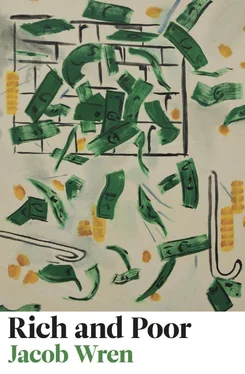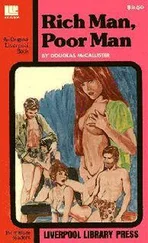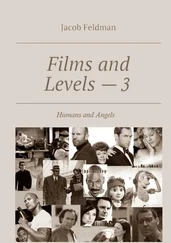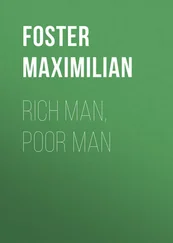There was silence on the other end of the line. I thought he had tired himself out, that he had nothing left. It was a long silence but I didn’t hang up. I kept the phone pressed against my ear, listening to nothing, wondering who would hang up first.
1.
I’m not sure how or when the notion that Emmett was entertaining — that he was the constant life of the party — first arose, but it was certainly repeated frequently enough over the years. Perhaps it began only as a sarcastic comment that someone without a good ear for sarcasm took too literally. I am also not sure why, when I began writing the book, I thought it would be a comical myth to perpetuate. Pretending the most humourless, mean-hearted, legal pit bull I have ever had the pleasure of knowing was instead a laugh-a-minute joke machine just felt right to me at the time, like a lie that concealed some greater truth, though with the considerable benefit of hindsight, I can no longer intuit what that greater truth might have been.
Emmett was our dirty jobs expert, perfect at going in for the kill, and therefore there was something perverse and poetic in painting him in this lighter hue. Many within our organization had heard frequent rumours of how entertaining he was, and were often shocked to finally meet him in person, perhaps assuming they had simply caught him on a bad day. But what was true is that he was the closest friend I’d ever had within the organization, and when he turned on me it was as if something broke. The fact that he was somehow tangled up in the attack, with that shithead in the elevator wrapping wire around my neck, is by far the most disturbing aspect of the entire incident. I want to give a name to my would-be killer. What should I call him? Something that will ease his presence in my mind, make him look foolish, like he is of no threat and never was, which is in fact the truth. I don’t want his real name, which is meaningless to me, but instead something I control, something I own, some way to own that piano-idiot who attacked me.
There is a frequent pattern to my experiences in foreign cities. I arrive and am picked up at the airport by a junior employee, who first takes me to drop off my bags at the hotel. In the car, as we drive, I often ask questions about the company. With the inexperienced, it’s sometimes possible to get honest answers simply by asking direct questions at the exact moment they are least expecting it. In Italy, I am picked up at the airport by a young man who couldn’t have been more than twenty. He was an especially interesting case. When asked about his division, he would give roundabout answers, speaking about things I did not at first understand, though he spoke clearly enough and was never less than intriguing. He said that everyone who worked for his company was a virtuoso, because all workers today are expected to be virtuosos. A virtuoso was someone who could do many different jobs well, who could slide from one to the next with natural ease. And because working life for his generation was precarious, far more precarious than anything my generation had ever known, they had to be virtuosos. They would each have many different, many different kinds, of jobs in their lifetime. They had to be able to do each of them well, to retrain quickly, to think and learn on their feet. His English was definitely not perfect, and I wondered why he was telling me all this. It was like he had already decided I was old-fashioned, that I didn’t understand how the world worked today, and wanted to set me straight.
But of course, because he wanted to set me straight, I also wanted to set him straight, show him which of us was the voice of expertise and experience. Did he have any idea how many different jobs I’d had in my storied life, how many different kinds of businesses I had expertly run to get where I was today? Did he think his was the first generation to display flexibility? Because every generation thinks they’re different, unique, have reinvented everything that came before. My generation also thought we had reinvented the wheel and were creating something unprecedented. But things don’t change so much. In the end, his generation, much like my own, would realize they were repeating so many of the patterns that had come before. And he would realize it much like I was realizing it now, when someday someone much younger than him presented things he already knew all too well, and yet presented them as the brand new, exciting wave of the future. Then I told him that what was even a little tragic about what he was telling me is that it might be another twenty, thirty, forty years before he fully realizes, fully feels, how what he is saying now is genuinely not the full historical truth of his situation.
After my rant he took a long pause, as if he was carefully thinking over what I had said, which pleased me in spite of myself, and when he began speaking again he chose his words with much greater care. The difference, he explained, between his generation and mine is that his generation would use their virtuosity to undo business, the way businesses are run, and then put them back together using a far more collaborative model, with a more equal distribution of profits. They were virtuosos of collaboration and therefore had the skills to do so. It was like he thought he and his friends had invented Marx, and I wondered if maybe they could use their virtuosity to invent the Bible while they were at it. Then he told me that possibly I thought business, in its current form, would last forever, but I should look at my historical knowledge, since it would teach me that nothing lasts forever, everything changes, and while most often things change for the worse, if we work hard maybe sometimes things might also change for the better. And then he said something that really landed with me. He told me that he used the word ‘we’ on purpose, because he didn’t know me yet and therefore didn’t want to assume anything, didn’t want to assume I was the enemy. It seemed unlikely to him, but maybe if we talked, if he explained things to me as we drove from the airport to the hotel, I too might begin to think about the world differently and become part of the ‘we’ that is working, utilizing my own brand of virtuosity, towards something better. He wasn’t naive, but for him being too cynical was a kind of death, so he would prefer to see some sliver of possibility in every situation that presents itself, no matter how unlikely, which is why he volunteered to pick me up at the airport in the first place.
As I was unpacking my suitcase, hanging my suits one by one in the closet, I thought about how much harder the future would be than the immediate past. I wasn’t born rich — I struggled and improbably made it — but in the future, more and more, people would be rich only because they were born into it. It did not seem to me that my story was a template that would continue to repeat. They, the virtuosos of the future, were virtuosos with considerably less opportunity. Opportunities are short-lived. They last a few generations and then, victims of their own success, shut down again, as assholes like me close rank. So I understood why that young man wanted to reinvent business. The way it was currently organized would not serve his interests towards the same glory that it had once served mine. And then for a brief moment, in a different way than I had understood it before, I thought I understood why someone might want to attack me, why someone from the next generation might want me dead.
2.
Then one day, without knowing quite how it happened, I was on a bus, on my way to harvest tomatoes. So many days I had watched others pile onto the buses and not gotten on myself. Perhaps it was only that I was starting to feel like a tourist, but also my new friends were teasing me more and more mercilessly. I was the loser who never managed to make it onto a bus, the comical one who never managed to make a cent. I tried to take their jibes with good humour, because of course I knew what they did not, that I hadn’t come here to work and my money had not yet run out. But I didn’t like being teased. I wanted their respect.
Читать дальше












